Food as refuge
Culinary Connections serves refugees and community; Cowboy Star celebrates its 10th anniversary; La Concha Bakery creates a Dubai chocolate hybrid croissant + more food & drink news
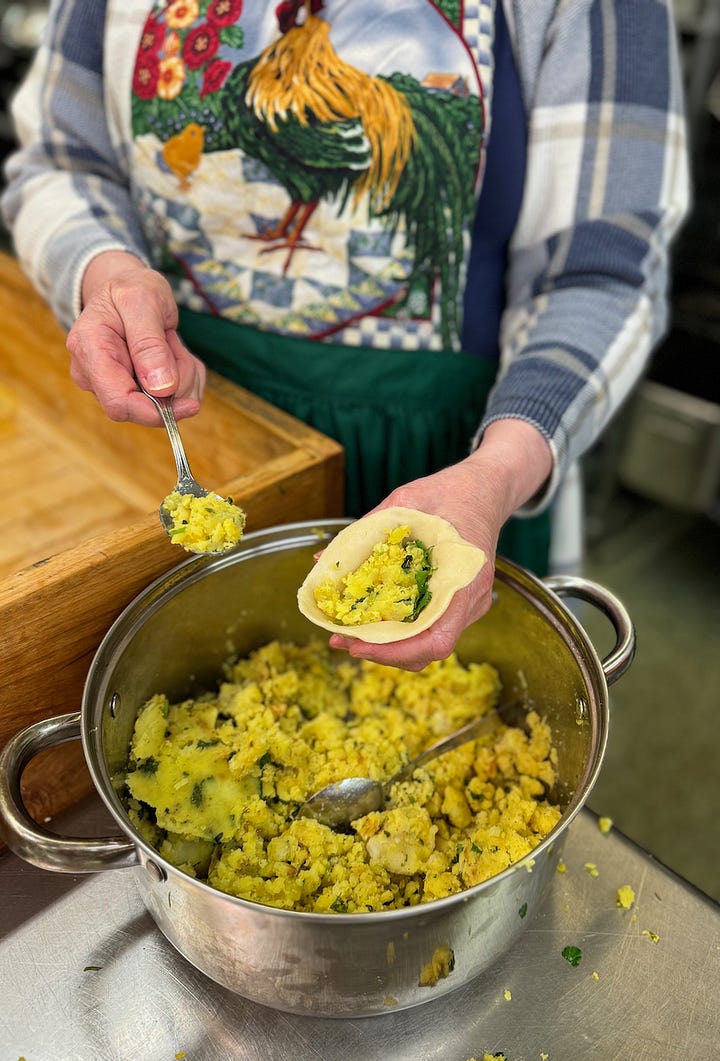
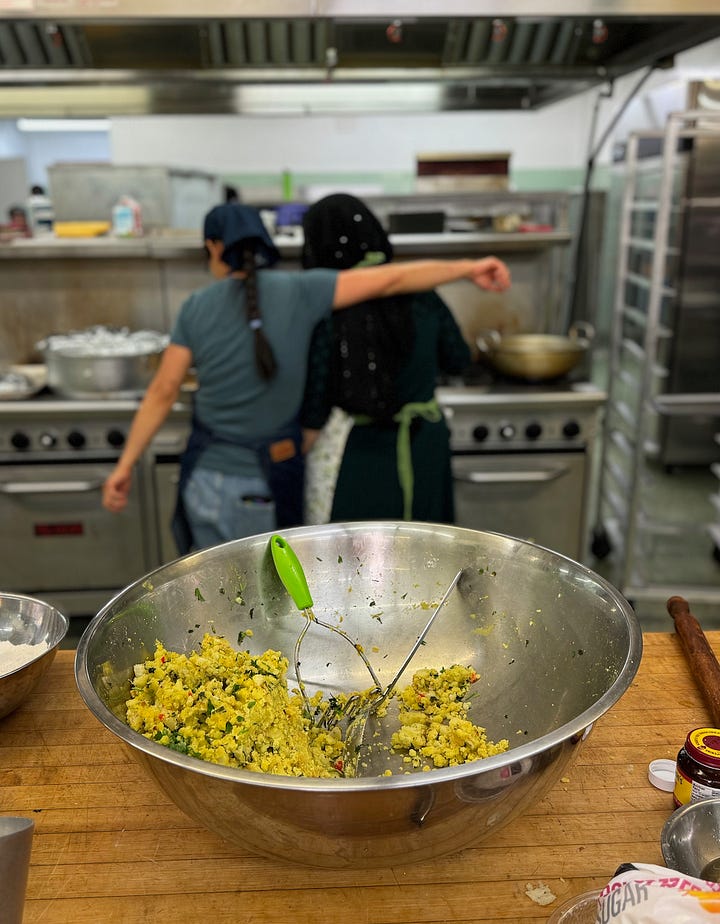
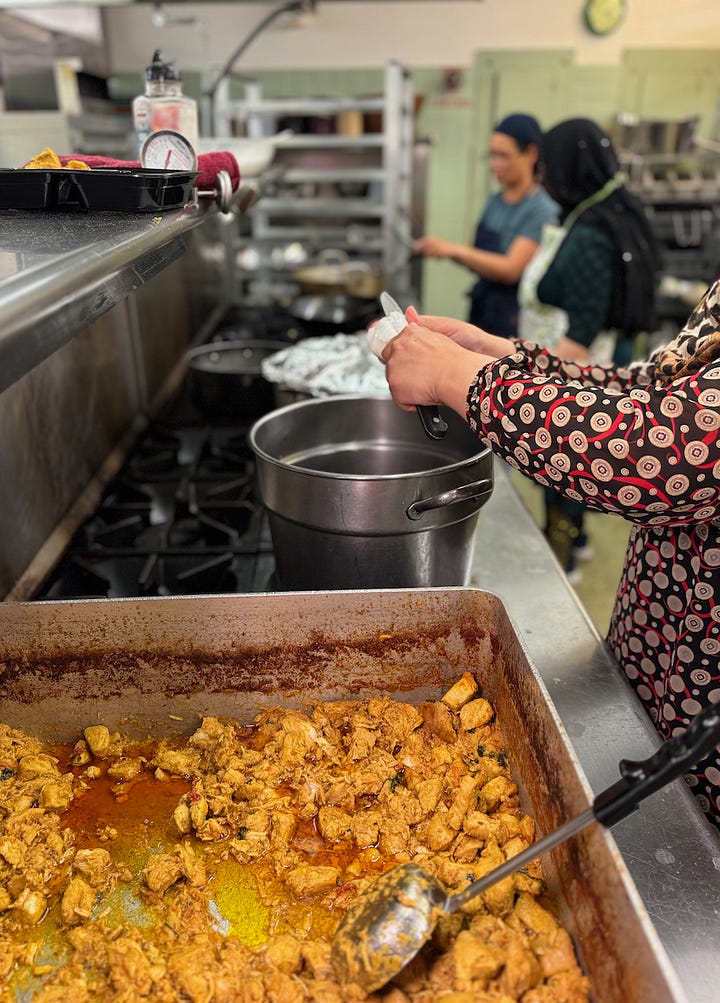

It’s a Saturday afternoon in late April and four Afghan women, supported by 10 busy volunteers, are cooking together in the basement-level, certified commercial kitchen of First United Methodist Church in downtown Colorado Springs. The air is laced with alluring spices and filled with the culinary cacophony of clattering pans and clinking spoons.
One woman slices garlic with a paring knife into a wide sauté vat for creamy Afghan chicken. Another stuffs a mashed potato mixture laced with ginger, turmeric, cumin and chile pepper into samosa dough bound for a fryer. The third stirs chopped veggies and masala seasoning with rice into a biryani dish.
Wearing customary head coverings and beautifully patterned dresses, they smile, laugh and embrace one another and the other women volunteers in between tasks. The mood is light, with excited anticipation, as 100 meals are due upstairs for 4:30 p.m. pickup by the community. What might look ordinary about this scene from a passing glance is actually extraordinary: the women are members of local refugee families already welcomed into our community but still struggling to assimilate and become financially stable.
This is the very first food service of Culinary Connections, a multi-organization project months in the making. Thanks to community members buying up all 100 of the $25 meals, which include huge, puffy wheels of Afghan naan and cardamom-spiked, dense beignet-like Nimkee cookies for dessert, each of these three women will go home today with several hundred dollars in their pockets. (The organizers’ respective agencies keep none of the money, but help facilitate payment for food cost.)
The significance of that contribution to their households, inside of a patriarchal culture where women are often not allowed to work and relegated to childcare, cannot be understated. A handout given to meal purchasers features a short bio on each family, with names removed for sensitivity, but details on their family size, living situation and their respective husbands’ employment situations.
Suffice to say, this is food with a mission, with purpose.
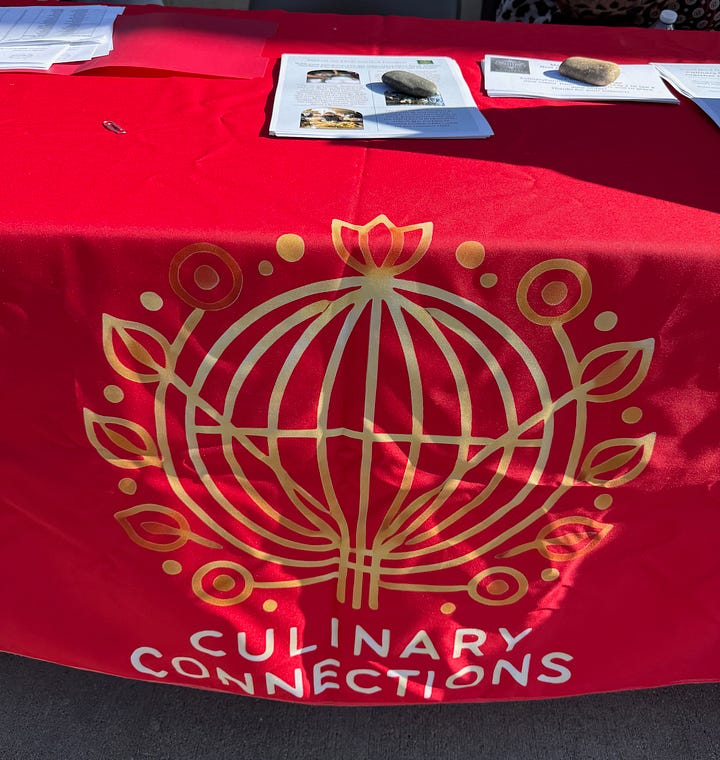

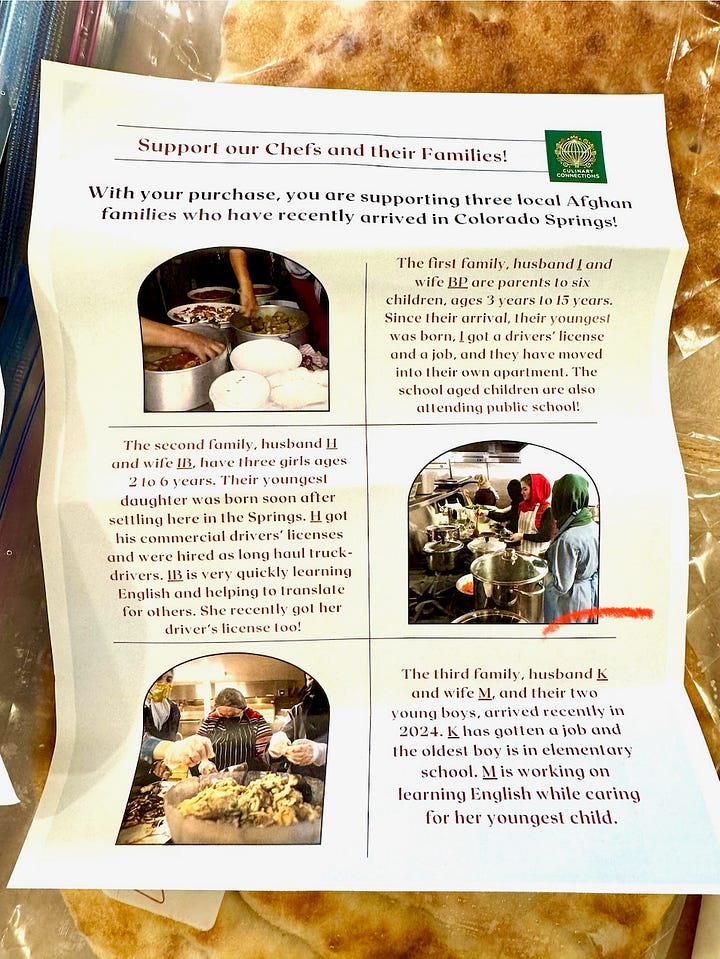

“These women are incredible home cooks, but generally wouldn’t be allowed to own and operate restaurants back home” says Amy Schulte, Executive Director and President of WelcomeCOS, a faith-based, privately funded nonprofit that works on refugee resettlement locally with partnering churches and other related organizations. A note on their website under a “why refugees?” section reads: “Diversity in our city is good. By welcoming refugees, we show that Colorado Springs is a welcoming city. Caring for refugees allows us to help families and individuals who are arriving legally in our community.”
Schulte says WelcomeCOS, along with the four other agencies that will be mentioned below, were unbeknownst to one another all working concurrently in recent months on creating something like what Culinary Connections has become. “Someone said, ‘we’re all talking about the same thing, so why don’t we work together? Together we’ll have a broader reach.’” For her part, Schulte, who prior worked with Lutheran Family Services (another local refugee services agency), was inspired by a group named Welcome Neighbor STL, in St. Louis, where she used to live. It has for years now operated a Supper Club with meals made by refugees. “My dream,” she says, “was to recreate that here.”
Beyond creating a single day’s income, these types of refugee-cooked food programs provide job training to participants. That tends to include safe food handling classes (to include certifications), education around budgeting and banking (for financial literacy, empowerment and independence), and necessary, adjacent instruction like language and literacy programming. Ideally, refugee participants might advance to ownership of their own cottage-industry or catering businesses. “We aren’t trying to change their culture,” says Schulte, “but instead identify what’s acceptable and give them opportunities within that, and push them a little out of their comfort zones.”
Reverend/Doctor Kymm Hockman at First United Methodist Church’s Prairie Campus, who also operates Genesis Equipping Ministries (her own nonprofit where she does project management), has been working with two of the women since 2021 and the third since 2024, as a cultural mentor. The church sponsored them, partly through grant funding, and donates the cooking space for this program. Hockman has helped the woman do some limited sales through the church, as some items like naan may be prepared at home legally via cottage industry standards, but she’s excited to see them be able to now prepare meat dishes in the commercial kitchen and expand their offerings. “They need the money desperately,” she says. “And when they have the money, it gives them agency and a voice in their own homes. And the husbands have been supportive; they’re home taking care of the kids today so the women can be here.” Two of the husbands drive for Uber and one recently obtained a commercial truck driver’s license, she notes.
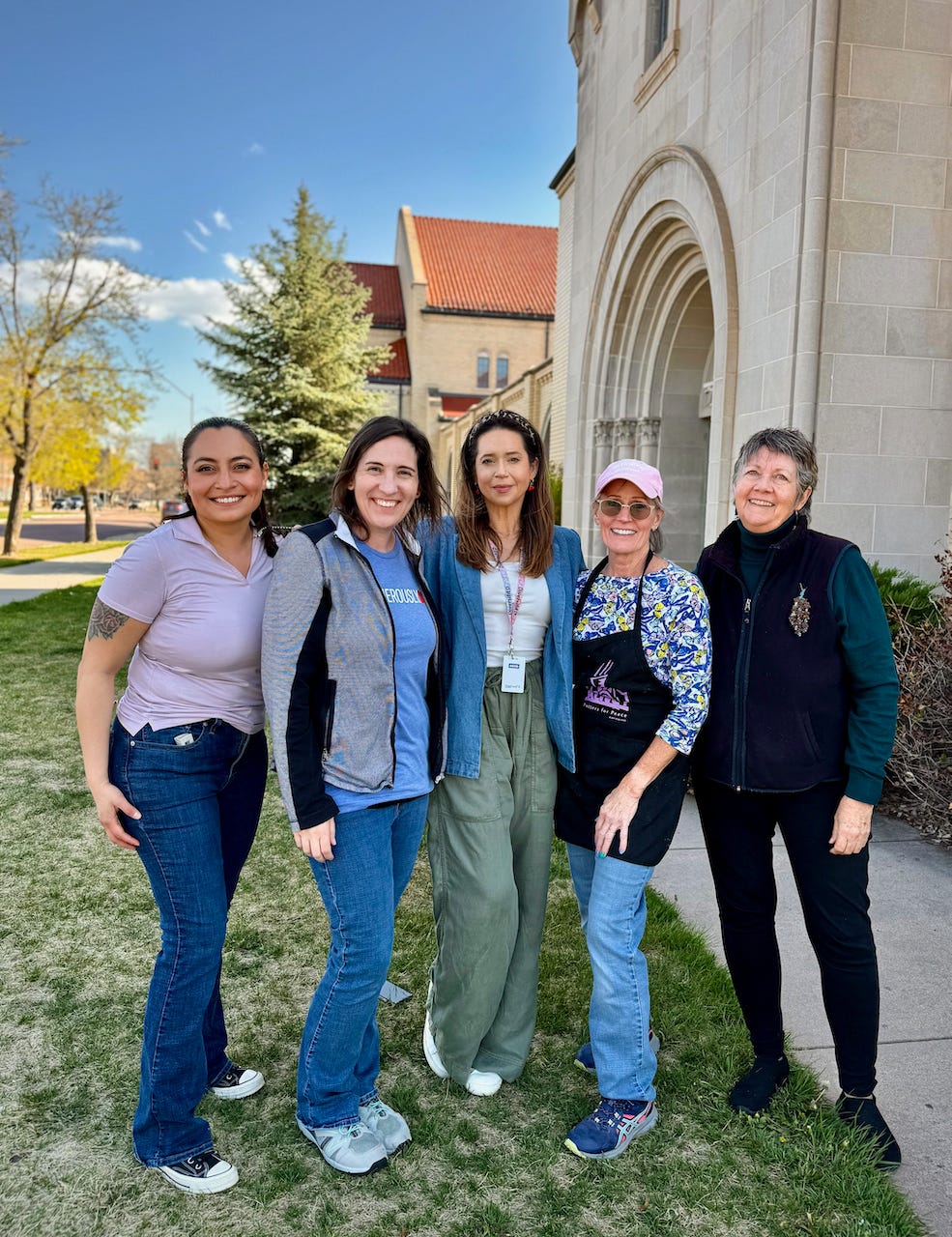
I speak to one of the women, agreeing not to photograph her face or use her name, and I ask what today feels like to her. In stumbling but pretty proficient English, she says “It’s special. I make money. That helps our families in Afghanistan. They can’t work there. I send my money home.”
Hockman tells me this woman is playing the head chef role today, directing the other women. Jokingly, she says when you get three women together in the kitchen, each wants to do it their way, so it helps to appoint a boss. Still, that boss gets assistance from Karen Ahumada Villanueva, who’s playing the kitchen manager role today, and who also helped oversee planning for the day. Villanueva is a project coordinator for DiversifiEd, a Denver-based consulting group that in-part does refugee, immigrant and asylee integration work.
It’s nearing 4:30 as I chat with everyone, and they’ve been here toiling away since 8:30 in the morning. I ask the Afghan cook if she’s tired, and she says “Yes, it’s hard work, but fun. It’s good community.” The food that I’ll later savor at home, simple but bright with spice and aromatics, and hearty, all comes from these women’s home recipes. It’s authentic Afghan food as they would make in their own kitchen, she confirms.
When it’s time for pickup, the team transports everything upstairs and the human ant-line leads to a card table set up in the parking lot. It’s draped with a bright red, newly created Culinary Connections-logo tablecloth. The Afghan women sit behind the table to greet arriving guests as volunteers fulfill orders and shuttle delicately packed to-go bags out from a church kids playroom. The customers are gracious as they file through, thanking the women as they pocket the informational brochures about the program and the day’s menu.
I strike up a side convo with co-organizer Deborah Thornton from Imagination Celebration, which I had prior associated with visual arts endeavors in the community. She tells me “culinary is an important form of creativity,” and that in the past two years of working with the refugee community “it has demonstrated the effectiveness of creative engagement for mental health and wellness, and for addressing trauma.” During that time span she says Imagination Celebration has connected with roughly 50 Afghan families, as well as dozens of Ukrainians. They’re poised to soon work with Central Africans, Cubans and more nationalities. “These are beautiful, courageous, resilient, kind and hard-working people,” she says. Speaking about these Afghan women in particular, she says “They love cooking. They’re so eager to do this.”
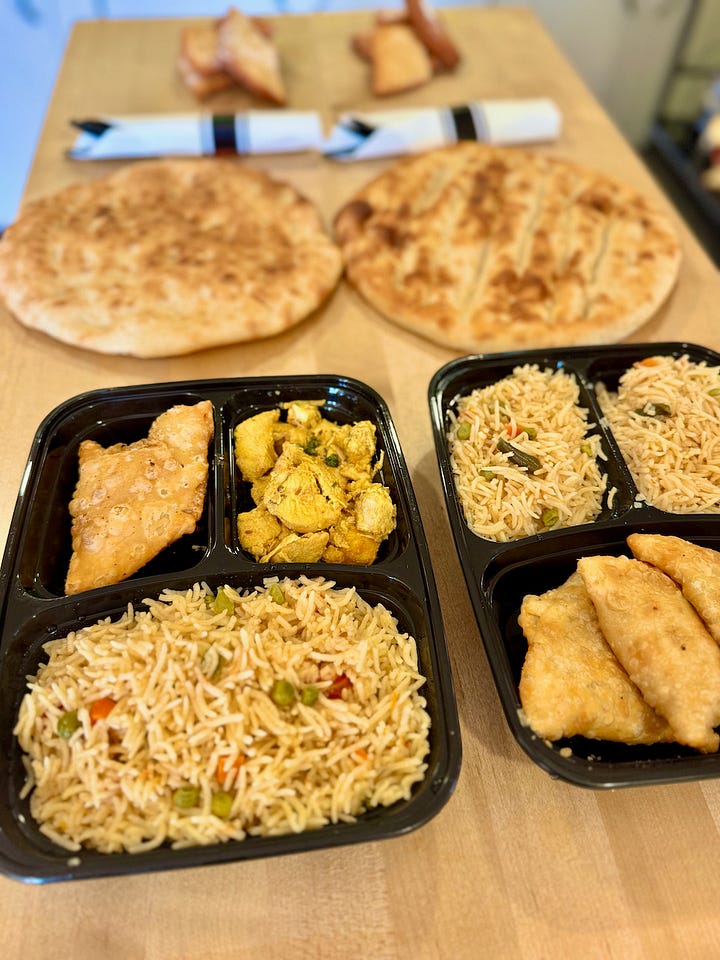

I last speak with the final co-organizer, Louise El Yaafouri, founder and principal consultant at DiversifiEd. Helping me better understand the structure of Culinary Connections, she says that for their part, her company holds a state grant for refugee integration services via the Colorado Refugee Services Program, under the Colorado Division of Labor and Employment. This allows them to contribute “strategy, human resources, equipment, and case management for the chefs. The grant is focused on building economic capacity and enhancing integration among Office of Refugee Resettlement-eligible populations.” Further, she explains, “We have an existing relationship with this cohort's chefs via sister programming called The Creative Exchange,” and a Therapeutic Arts partnership with Imagination Celebration.
You’re heard the idiom “it takes a village.” This is what that looks like.
Echoing what Thornton had said to me, El Yaafouri says “These women are eager, hard working and excited to share their culture and be economic drivers in the community.” She speaks with 20 years’ experience working with refugees, she tells me, and says historically refugee resettlement work in Colorado has been siloed between agencies, so Culinary Connections represents a milestone toward collaborative community approaches. And that’s important now more than ever.
A note at the top of WelcomeCOS’ website reads: “Over the past month, refugee care has been dramatically impacted by federal administrative decisions. New arrivals have stopped, flights have been canceled, and our newest arrivals have been barred from services and funding. … Will you come alongside us and stand in the gap?”
WelcomeCOS’ Schulte, who joins in a group conversation now between El Yaafouri, Thornton and myself, says “closing our borders and ignoring a world in need is not the solution. For those who’ve gone through legal processes and waited years, it’s an abandonment and reprehensible. America has always had a way of being welcoming.”
The women explain that with truly vital frontline organizations now gutted by federal cutbacks, it’s the second-line organizations like theirs that are trying to step up and address community needs. “Folks are here,” one of them says. “And you can either have pro-socially integrated families or not. They can be isolated inside their own small communities, or learning about and participating in their new culture. These resources are to help them become productive members of society.”
Some refugees have lost case workers, and there’s been widely reported national news stories about unaccompanied children in other immigration cases who’ve been forced to go to court without legal representation — including a 4-year-old. These women tell me that so many services were trimmed the last time this administration was in office that many agencies spent the last four years rebuilding, “but now it’s backwards again, times ten.”
So, ultimately, what is Culinary Connections, beyond a few refugee women cooking together in a church for a supportive community?
Having observed the effort and tasted the outcome myself, I can tell you it’s nothing short of a radical act of cooking. As I said before, this is food with a mission, with purpose. You know the difference when you’re eating food made with love. This is it.
*The next Culinary Connections Afghan meal will be served May 17. Reserve early after May 1. Following Afghan meals, future months’ programming is slated to feature Syrian food and hopefully other nationalities’ food, says organizers. A future goal is also to host in-person meals so community can gather and hear participants’ stories first-hand, for “more cross-cultural engagement.” Aside from purchasing meals, donations to support Culinary Connections’ work may also be made (by scrolling to the bottom of this their website, here).
Cowboy Star celebrates its 10th anniversary
Earlier this week, Cowboy Star closed for a night to invite its purveyors and most faithful customers (and a few fortunate media members) to a private thank-you party and 10th anniversary celebration. The evening also acted as a fundraiser for Angels of America's Fallen, with all attendees donating a minimum $10 upon entry.
I took the opportunity not only to enjoy some outstanding food and drink treats (brisket, ribs, lots of side items and desserts among the bites, and a great Old Fashioned as one sipper), but to talk to all the leadership on site to find out what’s new lately, and how they were feeling about hitting the 10-year mark here, especially having endured the challenges of the Covid pandemic and everything else restaurants have made it through during the time span.
Backing up in case you’re new to the brand, it launched in San Diego in 2008, and has not expanded past these two locations since. It serves high-end steaks, sourcing from the likes of Snake River Farms (out of Washington) and Niman Ranch (based in Colorado), both of whom operate humanely and sustainably. I meet Head Butcher Enoch Morales in the attached butcher shop (11 a.m. to 7 p.m., Tuesdays-Saturdays), an experienced hand who’s coming from other fine steak outfits in Denver and California. (Said shop sells baguette sandwiches on daily-delivered The French Kitchen breads, which are also utilized elsewhere on the menu.) And I chat briefly with Executive Chef and co-owner Victor Jimenez and Chef de Cuisine Nick Ryder (who’s been with the company more than seven years); they note their quarterly menu refreshes and proudly talk about other fine local products they buy, such as Microvora mushrooms.
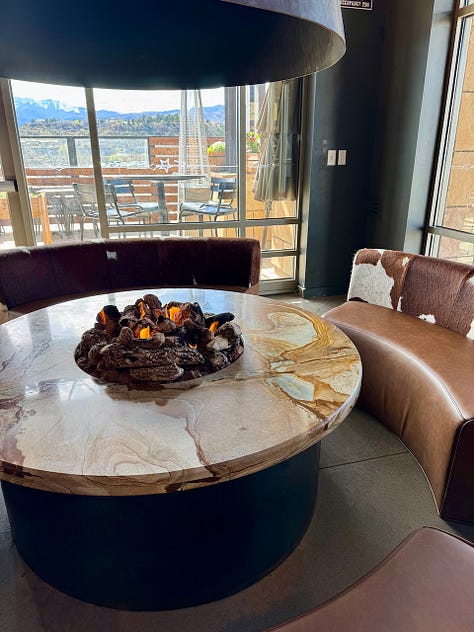

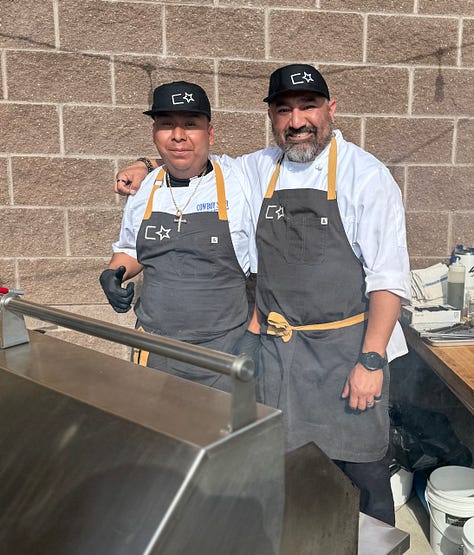

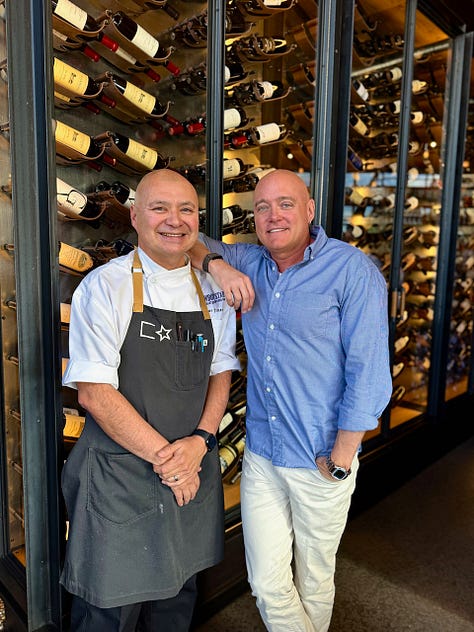

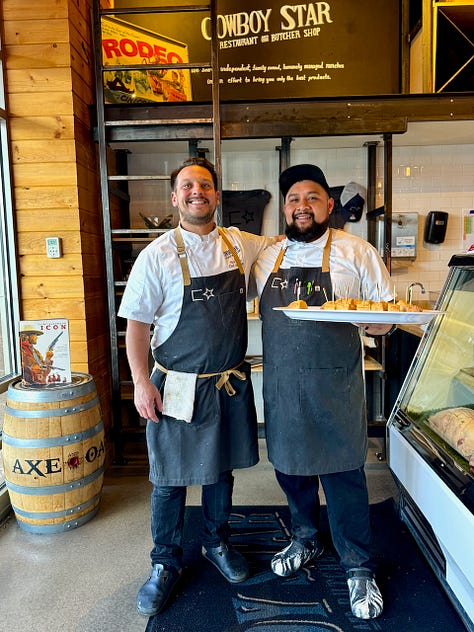


I speak with local GM Ryan Murphy and co-owner Jon Weber about the newly remodeled entryway bar/lounge area. Cowboy Star had closed for a week in mid-February to do an interior refresh there, working with a local designer to remove a dividing wine display and metal shelving installation. The re-work gained them an extra (and needed) 17-20 seats in the lounge. (That’s where you’ll want to catch daily happy hours from 3-6 p.m. with affordable $7-$10 items.)
I ask Weber how he’s feeling about committing to the Springs a decade ago, and he says “it’s exceeded our expectations — we just signed on for an extended lease.” But he notes that it wasn’t gangbusters from day one. “When we first came, it was an uphill battle, but the community eventually got behind us. We stayed focused on what we do — not looking at everyone else. We’ve always said ‘we do what we do.’ And after Covid something really clicked. Now, we feel that we’re more part of the fabric of the community.”
He says the decision to throw this 10-year-anniversary thank-you was “for the people that got us here today. They’ve watched us grow and been with us along the way.”

Bites & Bits
• Bellas Bagels has been named among Yelp’s 2025 Top 100 Local Businesses list (as part of Small Business Month, each May). They’re featured in a Food Retailers category with 19 other outfits recognized nationally. Bellas owner Jason Stele shares an email from the company with me, which outlines how they select celebrated places each year: “We analyzed Yelp data to spotlight businesses with exceptional ratings, review quality, and community impact — and your business stood out.” All of which is to say the superfans and wider town supporters who’ve supported the shop since it launched two years ago are part of making this happen. “We didn’t open Bella’s to chase awards — we opened it to bring people together over something delicious,” Stele tells Side Dish. “But this? This is incredibly special. Thank you to the Colorado Springs community for supporting us every step of the way. We’re a small bagel shop with a big heart. This recognition is proof that love, hustle, and great food go a long way.” It takes an outstanding product to garner such praise and recognition and make the Top 100, so Bellas deserves credit for producing fantastic New York/New Jersey-style bagels — and awesome cream cheeses and bagel sandwiches. Stop by if you still haven’t seen their new, expanded space (that I wrote about here in January) which includes a coffee bar serving Loyal Coffee products. You can also find deals on Bellas Bagels now on Goodie Bag, the food waste-diverting app I told you about earlier this month, here.
• While at the Cowboy Star 10th anniversary celebration, I ran into Barista Espresso and Specialty Roasting owner Glenn Powell, who makes a custom blend for the steakhouse. (It features a mix of two Central American beans and one South American bean, he tells me as I pry for details. They also serve a Sumatran decaf, and all coffees are served in a French press by Cowboy Star.) I took the opportunity to chat him up about the wild state of the coffee marketplace given the recent U.S. tariffs on various imports. And that’s added to the prior challenges in the roasting world that I’ve previously discussed with Golden Pine Coffee Roasters’ owner Ryan Wanner. Powell, who’s been in the industry 30-plus years, confirms that it’s crazysauce out there right now (my word choice, not his), and that Brazil and Vietnam, who collectively produce over half the planet’s coffee, have had horrible crop yields due to extended droughts and subsequent weather calamities in the past year. That’s driven commodity coffee prices way up — as much as 140 percent since this time last year, he says. He pulls out his phone to show me one graph, which has coffee prices at around $2 then and $4.22 now. While the fine, craft roasters tend to buy higher quality beans from other direct sources compared to big-brand commercial names, the commodity pricing “drives the market” says Powell. So take that, and then add to it the new tariffs: 10 percent for most coffee-producing countries, including Brazil, but 46 percent on Vietnam, who alone accounts for roughly 15 to 20 percent of worldwide coffee production. (So yes, all signs point to how you’ll be paying more for coffee soon, if not already. Good times. 😩 )

• Last week, a New York Times article posed the question “How Did Our Taste Buds Get So Spoiled?” The amusing subheadline reads: “The modern palate craves maple-matcha-blackberry-thyme-yuzu-miso-caramel.” (All of which is to say it’s amusing and worth a read.)
• Tap&Table recently dined at the awesome Huevones food truck and we caught up with owner Gerardo Arreola, asking him to introduce himself to anyone not yet familiar with his fantastic food. Check out our short, two-minute video.
• “It’s May! Time for salads, flowers and fresh herbs,” says Season Two Taste. Check out their guide on How to Use Fresh Herbs in Your Cooking. Consider making their recently published Roasted Asparagus and Fennel Salad with Beets.
Celebrate Cinco de Mayo with Side Dish Dozen members
Side Dish Dozen happenings
T-Byrd’s Tacos & Tequila: We’re kicking off Cinco de Mayo early, on May 3, with our first DJ party of the weekend from 9 p.m. to 1 a.m. Return to party with us on May 5 from 4-8 p.m., with DJ Hotboii, $5 house margs, $3.50 tacos and $3 Corazon shots.
Four by Brother Luck: Reserve a seat for our next Top Chef dinner, May 14, with guest Manny Barella (season 21). At The Studio above Eleven18, catch dinners with Chef David Ortiz that include live watercolor painting by Melissa Antoniano at 6 p.m., May 2 and 3. Three-Course Empanada Experience with Chef Brother Luck, seatings May 6, 7 and 8.
The Chuckwagon 719: We’ve invested in new equipment, which means we’ll be showcasing our pitmaster skills and serving new, elevated barbecue dishes. Starting this week, that looks like smoker braised beef short ribs served with garlic mash and bourbon-glazed Red Bird smoked chicken quarters with a beurre monté sauce, carrots and loaded baked potato. Also, smoked prime rib (by the pound) will be added to the menu (Thursdays-Sundays, noon to sell out), and pastrami returns as well. Also our Seared Steer Steakhouse is serving this Friday and Saturday starting at 4 p.m.
Bristol Brewing Company: The Barrel Room is now open for the season! Also, May 17, 11 a.m. to 3 p.m., walk your best friend down to our Pooch Party for free pup photographs and caricatures, a pet-themed market, dog training demos and prizes. A Bristol Karma on Tap event, $1 from each pint will go to War Dog Memorial Colorado.
Red Gravy: Don’t let the Tejon Street construction keep you away; we’re fully open and have free, two-hour parking vouchers (just ask!). Stop in for Meatball Mondays, Wine Wednesdays, and Monday-Thursday Happy Hours, 4-6 p.m., with select appetizers, half-price wines, draft beers and well drinks.
Rasta Pasta: Lunch specials daily until 3 p.m. (Same great flavor, smaller portion, smaller price!) Our Happy Hour is the best kept secret in town: $3 Red Stripes, $4 house rum punch, $5 house wines, $5 munchies. Daily, 3-5 p.m.
Upcoming events
May 3: Check your favorite spots for Kentucky Derby Day programming; mint Juleps abound.
May 3: Isang Hapag, Isang Pamilya (One Table, One Family) dinner with Baon Supper Club at The Kamayan Hideaway by Lumpia Lheas. As part of Mile High Asian Food Week. Seatings at 5:30 and 8 p.m.; five courses, $100.
May 4: Pints and Poses at Urban Animal Beer Co. (Star Ranch Road location). First and third Sundays monthly at 10:45 a.m.; an hour of yoga + a pint of beer. $18.
May 5: Cinco de Mayo deals all over town. Too many to list. Search socials and disfruta por mi!
May 10: Mrs. Roper Romp Bijou Block Party with Vintage & Vinyl at Salad or Bust/Cocktails After Dusk. Noon to 5 p.m.
May 14: Taste of Tri-Lakes Cares at Spruce Mountain Events in Larkspur. 5:30 p.m. – 8:30 p.m. $50-$60 gets unlimited tastings from 15 area eateries.
May 18: Monthly Paella on the Patio nights at TAPAteria kick off.
*Early notice: June 1: 719 Battle of the Food Trucks. July 17: 2025 Taste of Pikes Peak.
Parting shot
Remember late last summer when I wrote about Rocky Mountain Chocolate Factory cashing in on the viral Dubai Chocolate Bar trend?
Well, the collective cravings for these things haven’t let up, and have even inspired other forms of the item, revered for its pistachio and kataifi paste. One of those inspirations locally comes from newbie La Concha Bakery, who’s now making a Pistachio Dubai New York Croissant — for $8.90, whereas they do also make the original bar for $17.
The creative Pistachio Dubai New York Croissant is a hybrid, actually, which blends the Dubai Chocolate Bar flavors with the form of a New York Roll pastry — also called a Cromboloni, itself a mashup of a croissant and a bomboloni (Italian donut filled with pastry cream). You still with me? Good.
We stop in last week to buy and try one, and I reconnect with bakery cofounder Sebastian Romero, who I’d met at the opening. He talks me through how they cut and roll-up the pastry dough into the puck shapes, baking them with stone on top to keep them compressed. They next pipe in the pistachio and kataifi paste to fill the core, then chocolate dip the top (à la the bomboloni) and cover that with more garnishing paste and pistachio pieces.
Is it good? Fuck yeah, it’s good! It’s sinfully sensational. We share and destroy it gleefully. From the flakiness to creaminess and crunchiness, it brings to bear all the best elements of the trendy items that it’s effectively a pastry portmanteau of.
We posted about the item on our Culinary Colorado Springs Facebook group last Friday, and that post has since been viewed by more than 140,000 people (as of this writing) according to metrics it’s showing us. So yeah, all the virality continues.
I check in with Romero throughout the week to inquire about sales and he says they increased their pars of the item up to 70 per day, then 100. On Sunday they had their “busiest morning of all time” since opening in early January.
Though these Pistachio Dubai New York Croissants are the thing of the moment, their sandwiches are actually their bestselling item he says, some days equalled by croissant sales. They move around 50 loaves of sourdough daily, too, and coffee sales (of Mission Coffee Roasters product) have dramatically increased, he says. And all of that’s just a small portion of their overall offerings. So yeah, suffice to say, they’ve been strongly embraced by the south side community and beyond.

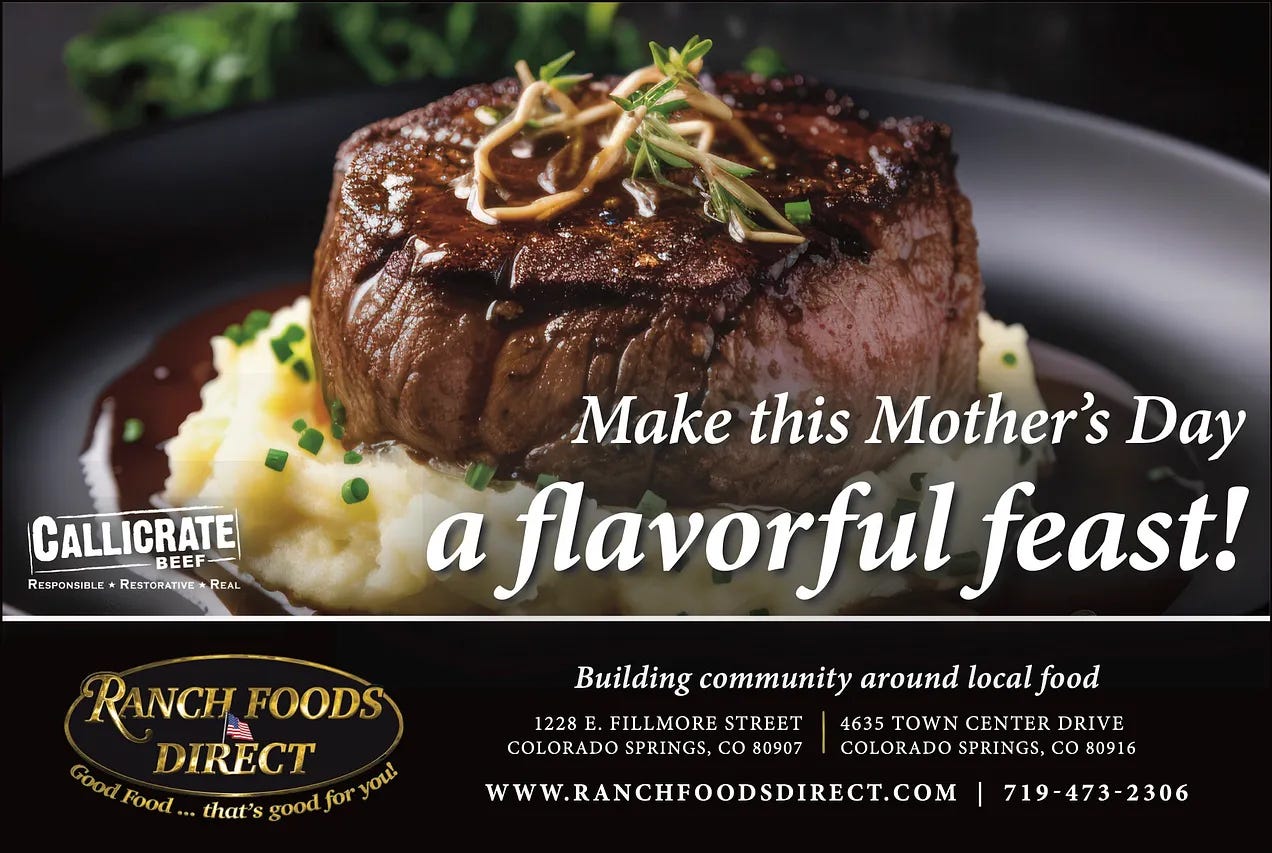
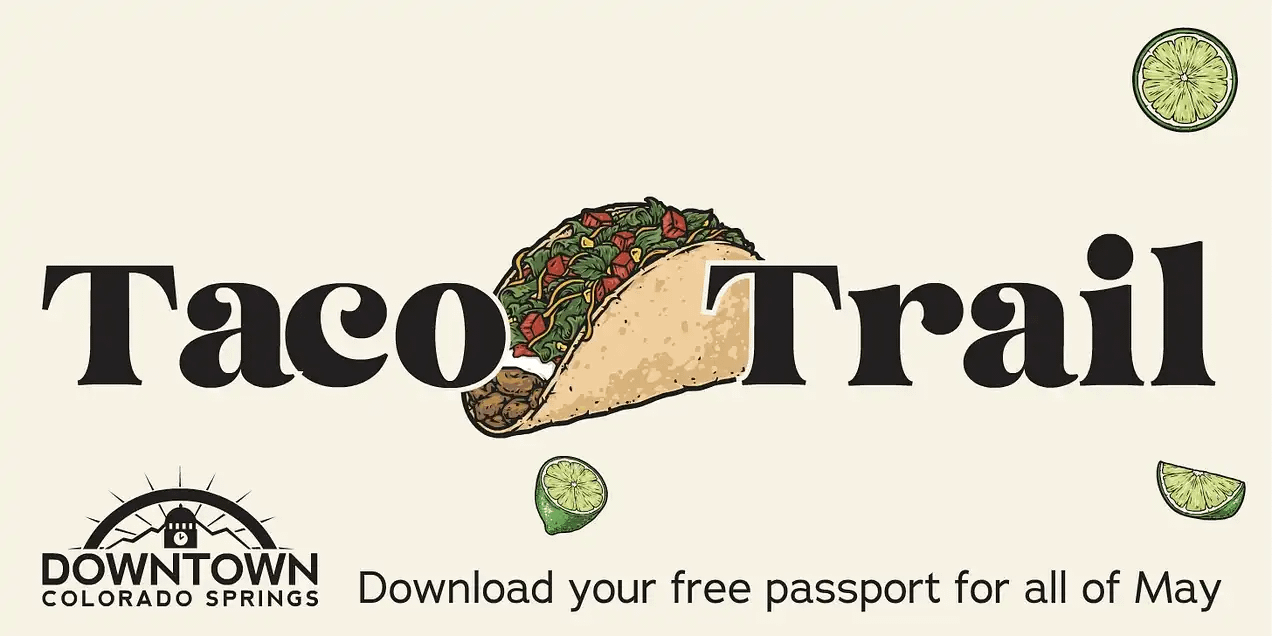






Great CC article! Love the kindness and hope. Just ordered 2 dishes! Can't wait.
There is so much good stuff in this article! Thanks for sharing about Culinary Connections (so cool!) and I cannot wait to get to La Concha for so many things - in addition to that Dubai situation.